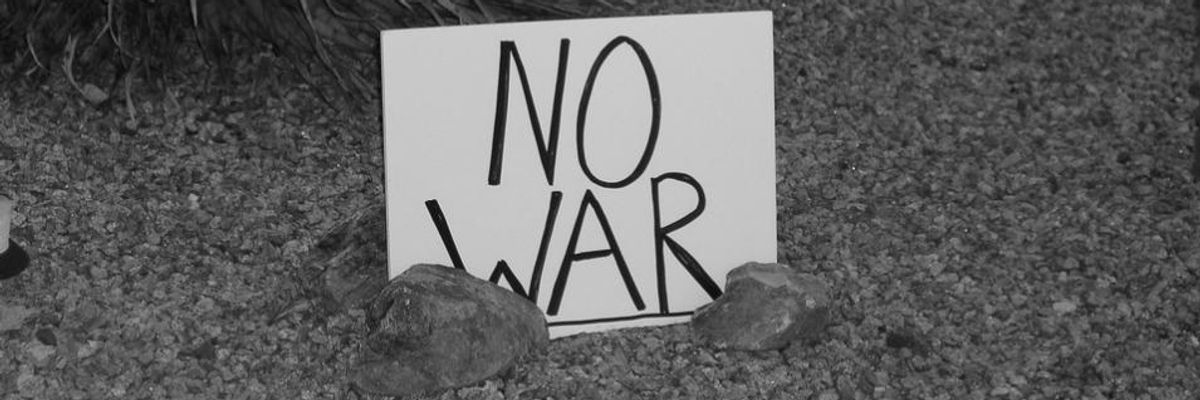Our kills are clean and secular; theirs are messy and religious.
"In their effort to create a caliphate across parts of Iraq and Syria," CNN tells us, "ISIS fighters have slaughtered civilians as they take over cities in both countries.
"In Syria, the group put some of its victims' severed heads on poles."
Stomach-churning as this is, the context in which it is reported - as simplistic maneuvering of public opinion - numbs me to its horror, because it quietly justifies a larger, deeper horror waiting in the wings. To borrow a phrase from Benjamin Netanyahu, this is telegenic brutality. It's just what the U.S. war machine needs to justify the next all-out assault on Iraq.
"In another instance caught on camera," the CNN report continues, "a man appears to be forced to his knees, surrounded by masked militants who identify themselves on video as ISIS members. They force the man at gunpoint to 'convert' to Islam, then behead him."
This is positively medieval. In contrast, when we kill Iraqis, it's quick and neat, as emotionless as a chess move. The same CNN story informs us: "Iraqi officials said U.S. airstrikes Saturday killed 16 ISIS fighters, and an Iraqi airstrike in Sinjar killed an additional 45 ISIS fighters, Iraq state media reported."
That's it. No big deal. The dead we're responsible for have no human qualities whatsoever, and our killing them is as consequence-free as cleaning out the refrigerator. It's simply necessary, because these guys are jihadists, and, well . . .
"The main U.S. strategic priority now should be rolling back and defeating ISIS so it can't establish a terrorist caliphate," the Wall StreetJournal editorialized several days ago. "Such a state will become a mecca for jihadists who will train and then disperse to kill around the world. They will attempt to strike Americans in ways that grab world attention, including the U.S. homeland. A strategy merely to contain ISIS does not reduce this threat."
And here's South Carolina Sen. Lindsey Graham, saying the same thing with more hysteria on Fox News, as quoted by Paul Waldman in the Washington Post: Obama's "responsibility as president is to defend this nation. If he does not go on the offensive against ISIS, ISIL, whatever you want to call these guys, they are coming here. This is not just about Baghdad. This is not just about Syria. It is about our homeland. . . .
"Do you really want to let America be attacked? . . . Mr. President, if you don't adjust your strategy, these people are coming here."
The belligerence that passes for patriotism has never been more reckless. I was stunned by these arguments a decade ago; the fact that they're coming back pretty much intact, rising from their own ashes to call for a new war to quell the horrors created by the old one, pushes me to a new level of incredulous despair. Fear springs eternal and can always be summoned. War devours its own lessons.
As Ivan Eland wrote recently at Huffington Post: "In war, the most ruthless groups grab the weapons and use them on everyone else. If doubt exists about this phenomenon, when ISIS recently invaded Iraq, it disarmed the better-equipped Iraqi military and sent it on the run. In its current air campaign against forces of the now renamed IS, American airpower is fighting its own weaponry."
He added: "With such a great recent track record, one would think that American politicians would be too embarrassed to get re-involved militarily in Iraq. But they now think they need to fight the monster that they created. But if IS is more ferocious than its ancestor, al Qaeda in Iraq, what more formidable creature are they now creating in opposition to U.S. bombing?"
Let's let this sink in. We completely destabilized Iraq in our now officially forgotten "war on terror," displacing millions of people, killing hundreds of thousands (and by some estimates more than a million), shattering the country's infrastructure and polluting its environment with war's endless array of toxins. In the process of doing all this, we stirred up unimaginable levels of animosity, which slowly militarized and became the present Islamic State, which is viciously and ruthlessly taking the country back. Now, with our ignorance about Iraq's socio-political complexity intact, we see no alternative but to jump back into a bombing campaign against it, if not a far wider war.
President Obama and the moderate Democrats see this as a limited, "humanitarian" intervention, while the Republicans and the hawkish Dems are clamoring for a major killfest in order, once again, to protect "the homeland," which otherwise they would prefer to abandon for tax purposes.
And the mainstream analysis remains as shallow as sports commentary. Military intervention, whether full-bore, boots-on-the-ground, or limited to bombs and missiles, is always the answer, because war always looks like a solution. What's missing above all else is soul-searching of any sort.
Meanwhile, Iraq and its people continue to suffer, either directly at our hands or at the hands of the monsters we've created. As the arms dealers would say, mission accomplished.

